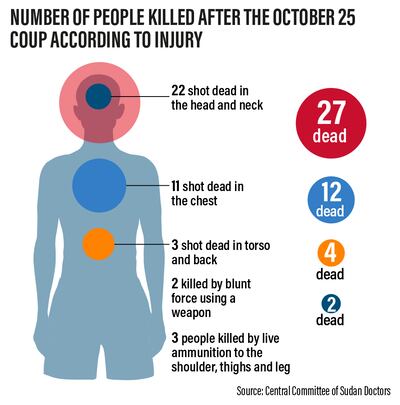Three years after the revolution that removed long-time dictator Omar Al Bashir, Sudan’s streets are gripped by mass protests demanding a civilian-led government.
The military’s modus operandi is to disperse gatherings using tear gas, stun grenades and live ammunition, a combined barrage that has become all too familiar to opposition groups.
In the face of this threat, local civilian groups have resorted to organised, pre-emptive measures to brace for deaths, injuries and arrests at the hands of the security forces whenever protests are planned.
One such group is the newly formed Lawyers Emergency Committee.
It has used social media to offer pro bono assistance to protesters planning to attend the “million-person march” on Sunday, being held to mark the third anniversary of Al Bashir’s fall.
Veteran lawyer Iqbal Ahmed Ali says her team has grown from 72 to 84 members after it made the statement less than a week ago.
“We started out working, not as the committee we’re known as today, in December 2018, when the protests against Omar Al Bashir first began,” Ms Ali said.
“Almost 80 per cent of the cases we handle involve ‘riot’ charges filed by authorities against protesters, although some do get charged with destruction of public property as well.”
Ms Ali says the committee does not defend vandals.

“However, there are situations where demonstrators are being unfairly accused of destroying buildings or setting fire to police vehicles. So, our team investigates to understand the facts at hand,” she told The National.
The committee has helped to release 300 people since 2018 and continues to follow up hundreds of other cases, Ms Ali said.
Prime Minister Abdalla Hamdok was detained by the country’s de facto military leader, Gen Abdel Fattah Burhan, on October 25, sparking widespread protests which are now in their eighth week.
Mr Hamdok, now released, reached a deal with the military on November 21 to be reinstated. Opposition groups continue to question the legitimacy of this agreement calling instead for a civilian-led government under the slogan: “No negotiation, no partnership, no compromise.”
The Central Committee of Sudan Doctors, which monitors and documents casualties from the protests, says at least 45 people have been killed since October 25.
Nazim Suraj is the general manager of Hadhreen, an organisation that helps hospitals to prepare to admit mass casualties on and around days of planned protests.
“Right now, we have 13 hospitals and three field clinics fully prepared in Khartoum, six hospitals in Bahri and four in Um Durman,” Mr Suraj said.
“We work with Sudanese people abroad to help us finance these large-scale preparations and assist with logistics as needed. For example, we had them help us arrange access to internationally registered Sim cards when local calls were being blocked to limit gatherings.”
Mr Suraj says local groups such as his have remained organised throughout what has been a chaotic time for Sudan.
Their grassroots efforts have helped to increase readiness for the unpleasant but now predictable events that accompany the demonstrations.


